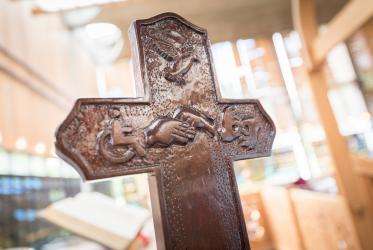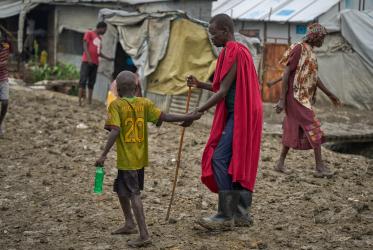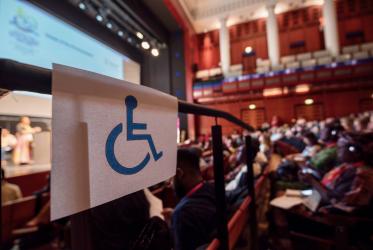By Hugh McCullum (*)
Free photos available - see below
Faith healing and spiritual cures have always been part of the church's ministry. But to many, they smack of magic, of mystical claims of "impossible cures", deeply foreign to "Western" patterns of religion. Conversely, those patterns are sometimes seen as dry fruits of aging churches which have lost contact with the living source of healing power. In the midst of this tension, the world's greatest modern pandemic, HIV/AIDS, is changing the concept of what the healing ministry of the church can mean. By bringing together people involved in one or other of these multiple facets, this rich diversity will be at the centre of the forthcoming 9-16 May 2005 World Council of Churches (WCC) Conference on World Mission and Evangelism in Athens.
The suburb is near Boston, one of the oldest and wealthiest cities in the United States. The church is middle-of-the-road Anglican. It is Sunday eucharist, and there is a "supply" priest instead of the regular incumbent. The supply priest however is a charismatic, Canon Mark Pearson, a clergyman who is co-founder of New Creation Healing Centre in nearby New Hampshire.
The eucharistic liturgy is traditional Book of Common Prayer. Pearson is not only charismatic, he is also conservative, or "orthodox", in Anglican parlance.
"When it came time for the homily, I pointed out that the prayer book Anglicans so revere contained a service of healing. Most of the congregation had never heard of it. I find many Episcopalians care more about things Episcopalian rather than Biblical. So I tried to make healing 'kosher' for them."
Pearson stayed away from anything exotic. "I asked people to remember when something highly out of the ordinary had occurred, often in the context of worship or personal prayer. I call them 'God-coincidences'. I reminded them that Archbishop William Temple, the late ecumenist and archbishop of Canterbury, said 'the more I pray, the more these coincidences happen'."
During the prayers for people, Pearson offered to anoint with oil and lay hands on anyone who wished to come forward for the Prayer Book healing service. "One man told me he had been diagnosed with cancer. I prayed for him, his doctor and the medications being used.
"As I was praying for one elderly woman, I got the sense that something was quite wrong with her pancreas. She had not had it checked, but told me she would ask the doctor at her next checkup."
After the service, several people told Pearson that the only kind of healing service they knew was the "wild kind", the "holy roller stuff", and that what they had experienced that morning was "not objectionable" . Pearson says he asked himself "Are they more concerned that nothing 'strange' happens than they are that something 'salutary' happens?".
The cancer sufferer was told soon afterwards by his doctor that his cancer had "suddenly, inexplicably" gone into remission, and the woman's doctor was grateful she had asked for a special look at her pancreas because, after examination, a problem was found in its beginning stages.
"You don't look like a charismatic or act like one, you never talked about the Corinthians gifts of the spirit," a member of the congregation said to Pearson. "If I came here 'packaged' as a charismatic, what would this congregation have done? They would have been turned right off. The packaging doesn't matter, the message counts. I try to package within the culture, and they understood."
Pearson will be an advisor at the 9-16 May WCC Conference on World Mission and Evangelism in Athens, where faith healing and charismatic healing will be on the agenda, raising fundamental and controversial questions within its two-part theme of "Come Holy Spirit - heal and reconcile!" Pearson will lead a workshop at the conference.
<span style="font-weight: bold; "» Centres of healing in the Congo
From the tidy suburbs of middle-class Boston, it is a huge leap to the culture, religion and healing of Central Africa, the Democratic Republic of Congo (DRC). A country suffering from up to ten years of war, three million dead, hunger, disease, malnutrition and little in the way of governance.
In some parts of the huge multi-lingual capital city, Kinshasa, independent charismatic healing churches have became people's only hope. They offer healing of body, mind, soul - a kind of counter-movement to the warlords, violence and corrupt officials.
There are several thousands of small healing church communities around the capital city, with its population of well over five million. Each community has around 100 members, mostly women and mothers. They gather almost every evening for healing, purification and prayer. The gatherings are highly emotional, but also filled with humour and laughter as people use parody, irony and playful critiques of their extreme poverty, making fun of the official "bosses" who control their misery.
Sunday worship lasts all day. People gather in small chapels, under trees, in the open. They bring and share food. The elders preach and expound on scripture, especially the gifts of the spirit (I Corinthians, 12).
After a community meal, the prayers and singing start in a free-wheeling way that bears no resemblance to the Book of Common Prayer. The women dance and sway and begin praying and speaking in tongues inspired by the Holy Spirit. People go into trances which are explained as a "river" connecting them to their ancestors. "Up the river is the community's prophet, and down the river is the world of the ancestors."
It is a sacred space. People jump up and down; others lie quietly believing that while they are in this "corridor" or "river" in these trances, they are being cleansed of impurities or illness, which they see as being one and the same thing.
For people whose daily lives appear hopeless, these experiences, say DRC pastors and Christian leaders, mean spiritual revival, if only for a few hours. This helps them to survive their harsh environment.
Great emphasis is placed on healing all aspects of life. Money, for example is a feature of modern life for many villagers who lived the barter system. So money is cleansed in these healing communities from the influence of Satan to become an instrument of the Holy Spirit.
The community place is like a mother, a refuge from the overcrowded, poverty-sticken city, a "moral centre" - the role placed by mothers in traditional society. In this space, everyone is a brother and sister. It gives people courage to live. The Bible is still expounded upon, but is also used as something to tap against the members' heads to drive away evil, which has always and is still associated with sickness.
Healing and reconciling ministries take many forms. The CWME Athens conference will attempt to focus on the multi-faceted aspects of the healing ministry. It will intentionally bring together different aspects of whole-person healing, including the use of scientific, spiritual and psychological approaches in various cultural milieus. Several delegates from evangelical churches in the DRC will participate in the conference, and share their experiences of how churches in their country are exercising their healing ministry.
<span style="font-weight: bold; "» The world's greatest modern pandemic
Experts disagree about how many Indians are infected with HIV, but the UNAIDS' "low estimate" puts the number at 2.5 million - second only to its "low estimate" for South Africa of 4.5 million. The UNAIDS "high estimate" for India is actually 8.5 million as compared to its "high estimate" of 6.2 million for South Africa.
With international agencies predicting that New Delhi will be the AIDS capital of the world, Indian churches and their partners are mobilizing all their resources to combat the pandemic. Faith is the key to healing, says the AIDS task force of the National Council of Churches of India, which groups 29 Orthodox and Protestant churches.
Though only 2.3 percent of India's one billion people are Christian, the Indian church has put resources into hospices, education, teen (14-18) awareness-building, grassroots work with prostitutes, and especially into combating stigma, discrimination and a general lack of compassion for people with HIV/AIDS.
"The churches in India do have a strong tradition of health care work," says Dr Jesudas Athyal of the Mar Thoma Syrian Church of Malabar, "but they have not yet recognized the enormity of the HIV/AIDS problem, despite evidence of the rapid spread of the pandemic across the country. Accepting the problem is the first step towards overcoming it."
"Because the proportion of Christians affected by HIV/AIDS is still comparatively low, it is not yet seen as a problem for the churches," explains Dr Sara Bhattacharji of the Church of South India. "But the leadership is concerned and trying to see what they can do to educate themselves and their congregations."
According to Bhattacharji, "Christian health networks have been at the forefront of the challenge of HIV/AIDS, providing care and treatment with acceptance and love, education of the public and health professionals as well as preventive education, research, and networking with other agencies. These initiatives have often been ecumenical, with the involvement of Catholic networks."
There is no cure for AIDS yet, only the anti-retroviral drugs which prolong life. But they are in short supply, and hideously expensive for the poverty-stricken of the world.
AIDS figures are so harrowing as to be mind-numbing, but each figure is attached to a human being, a person created in the image of God, someone God loves. According to UNAIDS:
- Three million people died last year from AIDS, and 39.4 million are currently infected with HIV;
- Of the 14,000 new HIV infections a day in 2003, more than 95% were in low- and middle-income countries, and almost 50% were 15-24-year-olds.
- Home to just over 10% of the world's population, Sub-Saharan Africa has an estimated 25 million people living with HIV - or almost two-thirds of all people living with the virus worldwide.
Participants at Athens will not be able to ignore the frightening modern, and ancient, diseases that today are plundering the South of the health of its people and their future. The conference will have to deal specifically with such causes of these diseases as poverty and globalization. Bhattacharji and Athyal will be on the panel in conference workshops on the healing ministry of the church, and on indigenous people's resources in reconciliation among communities. [1,688 words]
(*) Canadian author and journalist Hugh McCullum is a member of the United Church of Canada. Former editor of two large-circulation church publications and host of a national television programme in his country, he also lived in Zimbabwe and Kenya. McCullum has had a long association with WCC Communications. Among his books are "The angels have left us: the churches and the Rwanda genocide" and "Radical Compassion: The life and times of Archbishop Ted Scott".
High-resolution photos to accompany this feature are available at:
www.wcc-coe.org/wcc/photo-galleries/other/cwme-healing/cwme-healing.html
[Sidebar]
The Conference on World Mission and Evangelism
To be held in Athens at the invitation of the Church of Greece, this is a major international meeting of more than 500 representatives from all continents and all major churches and denominations. Scheduled to take place from 9-16 May 2005, the conference is being organized by the World Council of Churches (WCC).
The main aim of the conference is to provide a space for Christians and churches to exchange their experience and think together about priorities in mission and the future of Christian witness. The conference seeks to empower participants to continue to form healing communities in celebration and witness, reconciliation and forgiveness.
The theme of the conference "Come Holy Spirit, heal and reconcile!" is a reminder that this mission does not belong to us, but is the mission of God, who is present and active as Holy Spirit in church and world.
Coming from WCC member churches and the Roman Catholic Church as well as Pentecostal and Evangelical churches and bodies, the participants include young people, women and men working at the frontiers of Christian witness, church and mission leaders, theologians and missiologists.
There have been 12 such ecumenical mission conferences since 1910. This will be the first time such a conference is held in a predominantly Orthodox context.
Website: www.mission2005.org
[213 words]






